|
|
|
Sort Order |
|
|
|
Items / Page
|
|
|
|
|
|
|
| Srl | Item |
| 1 |
ID:
091718
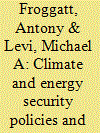

|
|
|
|
|
| Publication |
2009.
|
| Summary/Abstract |
Concerns about climate and energy security are leading to increased government intervention in the energy sector, in particular as they relate to the choice of energy supply options. While many of these options will improve both energy and climate security, many measures will benefit one while harming the other. This raises an important question for governments and energy planners: how can conflicts between climate and energy security be resolved? This article outlines some of the barriers and problems that may arise as governments and companies try to address climate and energy security concerns simultaneously in various energy supply areas. It concludes by arguing against choosing one objective over the other, and by outlining steps that can be taken to help resolve conflicts between the two agendas.
|
|
|
|
|
|
|
|
|
|
|
|
|
|
|
|
| 2 |
ID:
091817
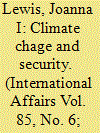

|
|
|
|
|
| Publication |
2009.
|
| Summary/Abstract |
The environment is increasingly affected by global climate change. While the causes of climate change are generated across the globe, the impacts of climate change will be highly variable at the local level. An increased scientific understanding of the potential impacts that climate change may have within China has raised new concern among China's leaders. Given that China's domestic realities inform its international policy choices, understanding how climate change may affect its population and natural resources is critical to global climate stabilization efforts. This article examines how the impacts of climate change on China, and China's response, will drive security challenges domestically, as well as in the greater Asian region and around the world. It shows that the impact of climate change on China will be significant and may have sizable adverse economic implications, particularly on vulnerable east coast economic centers. Water scarcity is a problem that already challenges China's leadership and one that will be exacerbated under projected climate impacts. In addition, the country faces the risk of international retaliation should it fail to undertake serious greenhouse gas mitigation actions. Yet China is not without options, and is already well poised to become a leader in the low-carbon technology revolution.
|
|
|
|
|
|
|
|
|
|
|
|
|
|
|
|
| 3 |
ID:
091820
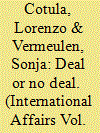

|
|
|
|
|
| Publication |
2009.
|
| Summary/Abstract |
Recent sharp increases in food prices have prompted some food-importing countries to promote the acquisition of farmland abroad as a strategy to secure food supplies at affordable prices. Businesses are recognizing new opportunities for strong returns from agricultural investment, including agri-food, biofuels and other agricultural commodities. Dubbed 'land grabs' in the press, large-scale land acquisitions have kindled much international debate, in which strong positions are taken on the impacts of such investments on the environment, rights, sovereignty, livelihoods, development and conflict at local, national and international levels. This article provides an analysis of this complex and shifting situation, focusing on Africa and drawing on quantitative inventories of land acquisitions in four countries and on a small sample of land deals. The article lays out key trends and drivers, and discusses the main features of international land deals before analysing the main risks and opportunities involved, focusing on implications for local, national and global food security. The article concludes by outlining practical steps to make the renewed momentum in agricultural investment work for development, and avoid the pitfalls of exacerbated political tensions.
|
|
|
|
|
|
|
|
|
|
|
|
|
|
|
|
| 4 |
ID:
091719
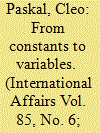

|
|
|
|
|
| Publication |
2009.
|
| Summary/Abstract |
As a result of environmental change, we are in an era in which planning constants, such as site stability and the location of fisheries, are now variables. Climate change and shifting population and consumption patterns are altering the foundations upon which we have built our physical and legal infrastructures. This article examines examples of the disconnects between planning and the changing physical world, including global energy infrastructure and the UN Convention on the Law of Sea. Some of the potential geopolitical, economic and security consequences are assessed, and some thoughts on how to ensure a more stable future are offered.
|
|
|
|
|
|
|
|
|
|
|
|
|
|
|
|
| 5 |
ID:
091819
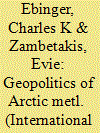

|
|
|
|
|
| Publication |
2009.
|
| Summary/Abstract |
The rapidity of Arctic melt is no longer the phantasmagoria of B-grade movies, such as the 'Day after tomorrow', but is occurring at a rate unimaginable just a few years ago. In 2007, more than one million square miles of ice melted, leaving the region with only half the ice that existed in 1950. The Arctic has been propelled into the centre of geopolitics as global climate change has transformed the region into a maelstrom of competing commercial, national security and environmental concerns with profound implications for the international legal and political system. The prospect of longer ice-free periods in the Arctic has momentous implications for the region's commercial development, in itself a further risk to melting Arctic ice. This article argues that Arctic melt does and will continue to pose economic, military and environmental challenges to the governance of the region and explores the role of technological factors as both a barrier and an enabler of access. Working within existing institutions and building capacity is preferable to the proliferation of new institutions, although the full structure and scope of the legal and regulatory frameworks that may be needed are, at present, unclear. But what is clear, is that Arctic melt is on the increase.
|
|
|
|
|
|
|
|
|
|
|
|
|
|
|
|
| 6 |
ID:
091816


|
|
|
|
|
| Publication |
2009.
|
| Summary/Abstract |
It is well-acknowledged that there is an imbalance between the existing structures and processes for global governance and the threats that the world is facing to its environment and natural resources. When swift responses to risk and uncertainty are required, formal international institutions and legal frameworks are found wanting. Climate change is accelerating and exacerbating worst case scenarios in the areas of energy, fisheries, forests, food, water and desertification, to name but a few, and intensifying pressures of poverty on natural resource management. The importance of avoiding policy failures of the past and failures of global governance has thus become more urgent. This article reviews the global governance challenges arising from complex resource risks and explores what has been learnt about effective risk governance. Global governance can not continue as though the world faces a 'business as usual scenario' and climate-related risks-systemic, complex, uncertain and ambiguous-require us to focus on particular aspects of global governance, many of which are those where performance has hitherto been weakest.
|
|
|
|
|
|
|
|
|
|
|
|
|
|
|
|
| 7 |
ID:
091716


|
|
|
|
|
| Publication |
2009.
|
| Summary/Abstract |
Energy security, climate change and food and water concerns are posing serious challenges to the management of international relations in an already turbulent world. These new developments-and the corresponding risk management strategies-will change the calculus of interests, powers and strategies for all actors, with significant impacts on the global political economy. Climate change action (such as targets for emissions reductions) will challenge the existing power structures, with the transition to a low-carbon economy creating new winners and losers in the global economy. Today, there is a fresh appreciation about the consequences of bad policy choices. Comparisons have been drawn between the fallout in the global financial system and the kind of risks that unmitigated climate change may bring. Even though the pressure on some resources may have eased since the onset of the global economic downturn in 2008, it is unlikely that the longer term trajectory has been reversed. This calls for renewed understanding and appreciation of the magnitude of risks foreseen. Multiple public goods need to be generated from the same production systems or sectors. In the context of climate change, international cooperation offers the only option that can best serve even narrowly defined national interests. Ensuring human security and peaceful relations among states in the decades to come will require short-term common action within the framework of long-term strategizing and visionary leadership as well as concerted efforts to deal head-on with worst case scenarios in our forecasting and policy planning
|
|
|
|
|
|
|
|
|
|
|
|
|
|
|
|
| 8 |
ID:
091815


|
|
|
|
|
| Publication |
2009.
|
| Summary/Abstract |
The use of civil nuclear power is set for major expansion among the world's developing economies. The pursuit of nuclear energy technology offers energy-hungry developing nations access to reliable large-scale electricity supplies with very low carbon emissions. But this climate-friendly energy solution comes at a security price. Historically, one third of the 30 countries that possess civil nuclear energy programmes have weaponized them. Security threats from the proliferation of nuclear weapons might become an important barrier to the further expansion of the global nuclear energy market. Nowhere is this tension more acute than in the Persian Gulf. Iran and the United Arab Emirates (UAE) illustrate how the establishment of civil nuclear energy programmes can pose different levels of security risk depending on a country's foreign policy. While the UAE has embraced international transparent nuclear safeguards, Iran has rejected the concerns of the international community and continues to develop uranium enrichment technology that may soon lead towards a viable nuclear weapon. However, the use of proliferation-resistant thorium rather than uranium as a nuclear fuel technology might significantly reduce the threat of plutonium weaponization in Arab states. The UAE nuclear energy model deserves the political support of western nations as the best compromise between nuclear energy expansion and nuclear security threats. This article discusses the myths and realities surrounding the diversion of civil nuclear energy programmes for military use in the Persian Gulf region, and argues that proliferation of atomic weapons is a political choice, not a certain technical inevitability.
|
|
|
|
|
|
|
|
|
|
|
|
|
|
|
|
| 9 |
ID:
091717


|
|
|
|
|
| Publication |
2009.
|
| Summary/Abstract |
In 1987, the authors of Our common future argued that unless the world embraced and operationalized sustainable development, it would risk being overwhelmed by a series of interlocking crises related to population growth, urbanization, poverty and environmental degradation. Since then, many authors have argued that the world is on a worst case scenario trajectory. Post-Rio assessments of progress towards sustainable development have been largely negative. Since 1987, climate change has added a new stressor to the mix while shortening the time frame for transformation. In the context of accelerating change and converging stresses is the concept of sustainable development as compelling today as it was twenty years ago? Is it reasonable to believe there are means by which to reduce poverty and simultaneously protect the environment? This article briefly reviews the global challenges that first stimulated the concept of sustainable development and asks how contemporary processes of global change are affecting both these challenges and this approach to addressing them. While there are some grounds for optimism, several variables are identified that make sustainable development increasingly difficult to design and implement. The article concludes with an evaluation of how these difficulties might be overcome, and why it is essential that we try.
|
|
|
|
|
|
|
|
|
|
|
|
|
|
|
|
|
|
|
|
|